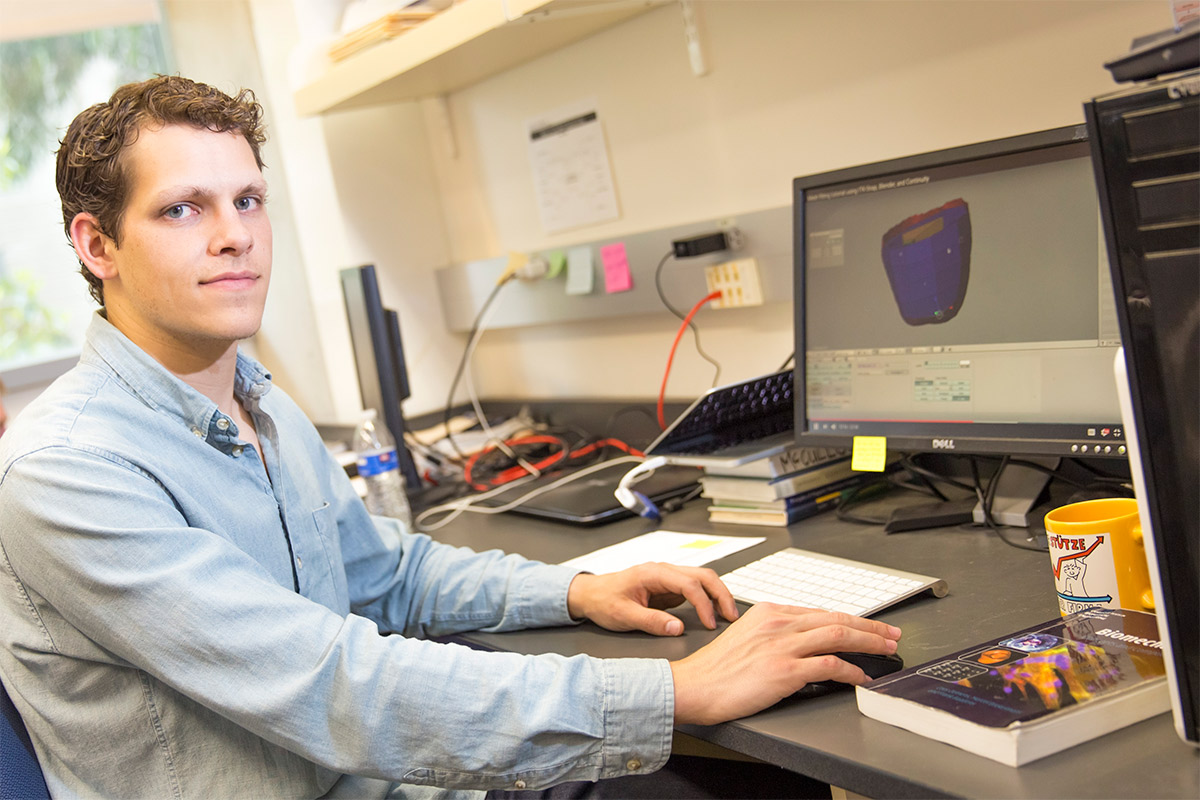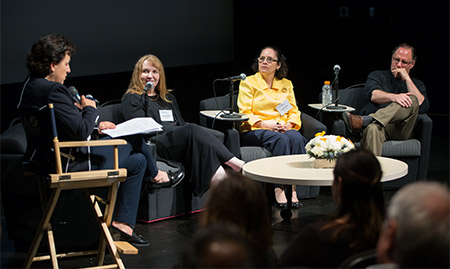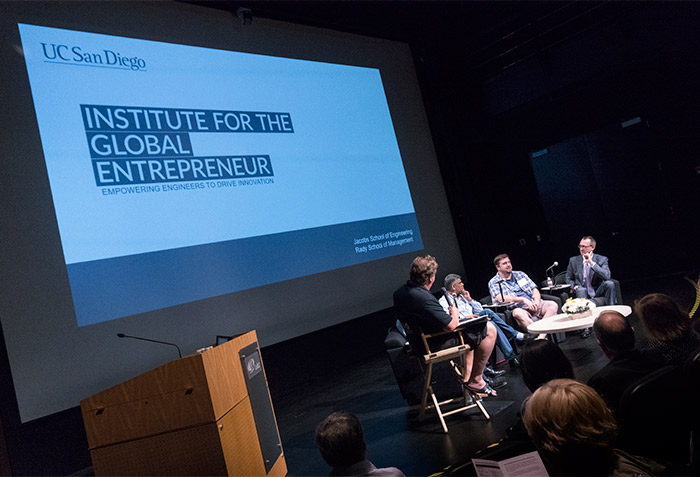
By:
- Daniel Kane
- Cynthia Dillon
Published Date
By:
- Daniel Kane
- Cynthia Dillon
Share This:

Nick Forsch
Global Change Makers
UC San Diego Launches New Institute to Train Students to Become Entrepreneurs and Technology Leaders
Nick Forsch relies heavily on clinician feedback for his research. As a bioengineering Ph.D. student at UC San Diego, he is developing computational tools to enable doctors to better understand their patients’ diseases. The challenges of translating his research to real-world doctors and patients led Forsch to join a new program at UC San Diego that places Jacobs School of Engineering graduate students and MBA students in the same Rady School of Management classes, including Rady’s signature Lab to Market program.
This collaboration is part of the new UC San Diego Institute for the Global Entrepreneur, which the Jacobs School of Engineering and Rady School of Management launched on June 2. Through the institute, UC San Diego’s world-class engineering and management schools are creating new ways to work together in order to ensure that the talent and research innovations coming out of UC San Diego have the maximum positive impact in San Diego, California and around the world.
“This institute is unique,” said UC San Diego Chancellor Pradeep K. Khosla. “The Jacobs School of Engineering and Rady School of Management are joining forces to focus on education, leadership and entrepreneurship training, and translation of discoveries to society. These efforts complement the incubators we have been building across campus, each with a slightly different focus but with the same goal: creating opportunity for our students and training them to be entrepreneurs and technology leaders,” said Khosla.

Mixing engineers and MBA students in the Lab to Market program is particularly exciting because Lab to Market challenges students to build a business around a real technological innovation. This is the core of a four-course pilot for the Institute’s new Technology Management and Entrepreneurism Fellowship Program. The pilot began in Spring 2016, and the plan is to develop it into a master’s degree program for engineers.
Electrical engineering Ph.D. student Somayeh Imani is also part of the first group of engineering graduate students going through the pilot program. She designs circuits for biomedical applications that could help improve human health and quality of life.
“Commercialization is hard,” said Imani, who ticked through a list of topics that she and her classmates were exposed to in the first quarter, including business plans and marketing. “There is so much opportunity in the field of wearables to commercialize technology,” Imani said. “I realized I needed this specific skillset to help our research group bring some of their wearable sensors to the market.”
Institute for the Global Entrepreneur Programs
The Institute of the Global Entrepreneur is built on a foundation of existing programs at the Jacobs School of Engineering and Rady School of Management. Together, these programs focus on entrepreneurism education, leadership and entrepreneurism training, translation of discoveries to market, and strategic partnerships.
“We are launching a big ship, and I’m very excited about that,” said Albert P. Pisano, dean of the Jacobs School of Engineering. “We are working closely with the Rady School to ensure our students have what they need to develop into technology leaders and change makers. At the same time, we are enhancing the relevance of our research by focusing on impact. We have a dedicated staff and team of 50 mentors and instructors working with Jacobs School and Rady School students and faculty, and this is just the beginning.”
The campus celebrated the institute launch with a June 2 event featuring entrepreneurship education and training thought leaders from campus and the National Science Foundation (NSF), venture capitalists who are focused on early-stage investments, and industry leaders and alumni who build and lead interdisciplinary teams.
“The Rady School was founded to facilitate the translation of scientific and technological discoveries into innovations that impact the community,” said Robert S. Sullivan, dean of the Rady School of Management. “I believe with the Institute for the Global Entrepreneur that we are creating a cauldron of innovation where the participants are empowered to do extraordinary things and create products and companies like we have never seen before.”

The Jacobs School’s von Liebig Entrepreneurism Center and Gordon Center for Engineering for Leadership are key parts of the new institute. The von Liebig Center hosts one of the most active NSF I-Corps sites for training engineering and science innovators in the lean start-up and customer discovery methodology.
The institute’s Path to Market platform helps entrepreneurs, innovators and inventors get the training, mentoring and support they need to translate their discoveries to society. These programs include business mentoring, the mystartupXX and StartR accelerators housed at the Rady School, proof-of-concept funding, entrepreneur-in-residence programs, and opportunities for innovators to present their work to San Diego’s startup ecosystem through events such as the entrepreneur’s showcase. The institute connects entrepreneurs to capital such as the Rady Venture Fund and the Triton Technology Fund.
Cross-functional Teams
“Building the right teams is critical to entrepreneurial success,” said Sujit Dey, director of the Institute for the Global Entrepreneur and an electrical engineering professor at the Jacobs School of Engineering.
As both a professor and an entrepreneur, Dey regularly sees disconnects between engineering teams and business and marketing teams that are supposed to be working toward the same outcomes; and these disconnects often doom efforts to commercialize inventions or launch new products within existing companies. One of the most exciting aspects of the new institute, according to Dey, are the efforts to get Jacobs School and Rady School students and professors working together more closely.
This has the potential for multiple payoffs. In addition to helping innovators create successful entrepreneurial teams, building cross-functional teams at UC San Diego prepares students, once they graduate, to build the teams that companies of all sizes need to address the toughest and most relevant challenges they face.
“Engineers are exceptional at solving problems, but now how do we prepare them for finding problems and framing problems?” asked Vish Krishnan, associate director of the Institute for the Global Entrepreneur and a Rady School Professor of Innovation, Technology and Operations.
This requires giving engineering students opportunities to develop into “T-shaped professionals,” explained Krishnan. These are people who have deep domain expertise as well as broad, holistic design and synthesis capabilities; people who think creatively and collaborate well with others.
Helping technical and MBA students develop into T-shaped professionals capable of much more traditional problem solving requires coaching and one-on-one interactions, said Krishnan, who is teaching the second course in the pilot program in Fall 2016.
Robotics researcher and first year mechanical and aerospace engineering Ph.D. student Adriane Minori will be in this class. Before coming to UC San Diego, she worked for a year and a half in industry. “I often wondered about the disconnect between industry and research,” she said.
That’s one of the reasons Minori applied to the program.
“I want to make robotics more accessible, and not just for first-world countries. I'm from Brazil, and if there's one thing I could take back to my country that would make a difference, it would be cheap robotics systems. The new technology management and entrepreneurism program is helping me identify the steps I need to take to translate my work on robots to the market,” she said.
Fellow mechanical engineering Ph.D. student Karcher Morris is also excited about this first new initiative of the Institute for the Global Entrepreneur. “In order to have a major impact in your community and in industry, you need to have a mix of people working with you—people to challenge the way you think. This program facilitates that.”
Share This:
You May Also Like
Stay in the Know
Keep up with all the latest from UC San Diego. Subscribe to the newsletter today.


